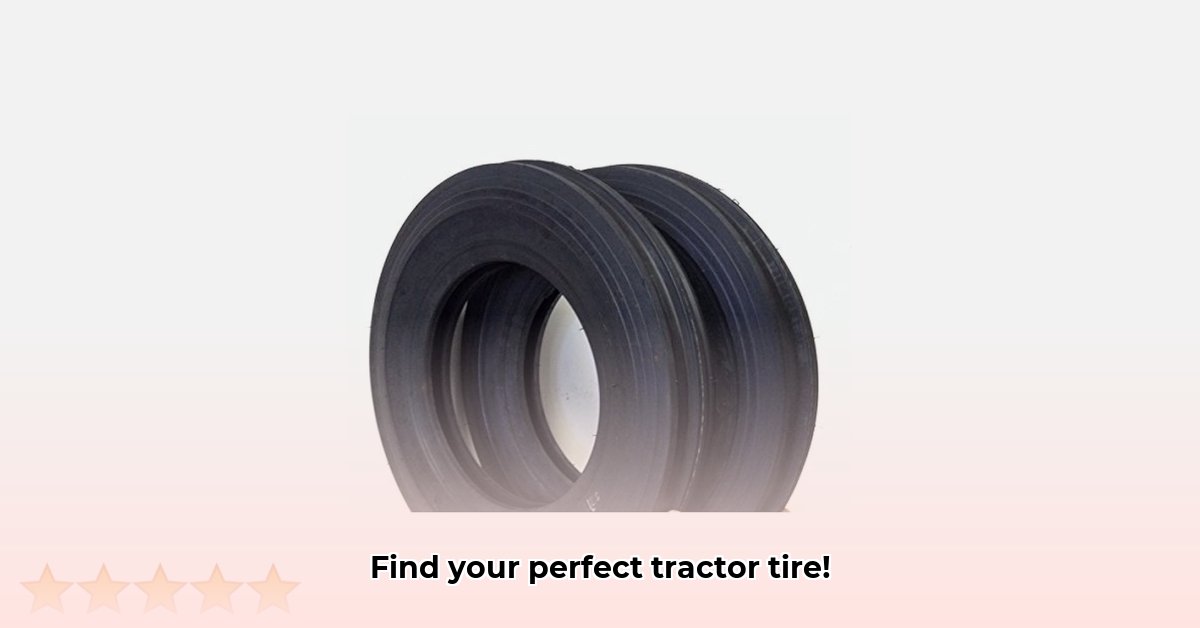
Choosing the right tires for your tractor is crucial for efficiency, longevity, and minimizing costly repairs. This guide focuses on 4.00-12 tractor tires, providing a comprehensive approach to selecting and maintaining the perfect fit for your needs. For more information on larger tractor tires, check out this helpful resource on 14.9x24 tractor tires.
Understanding 4.00-12 Tractor Tire Specifications
The seemingly simple "4.00-12" designation reveals key information about your tire's dimensions and capabilities. The "4.00" represents the nominal width of the tire in inches, while "12" indicates the diameter of the rim in inches. You might also see this expressed metrically as 400x12; both notations refer to the same tire size. This precise sizing is critical for ensuring proper fit and functionality on your tractor.
Beyond dimensions, the ply rating is crucial. This number, usually found stamped on the tire sidewall (e.g., 6-ply, 8-ply), indicates the number of layers of fabric within the tire. A higher ply rating signifies a stronger, more durable tire capable of handling heavier loads. Think of it like the weight of your fishing line: you wouldn't use a light line for a large fish; similarly, heavier applications require higher ply tires. This directly impacts the tire's load capacity – the maximum weight it can safely bear. Underestimating this could lead to premature tire failure and potential damage to your machinery. The load capacity is often specified in pounds or kilograms by the manufacturer and should be carefully checked against your tractor's usage requirements.
Identifying Your Tractor's Needs
Before browsing brands, assess your specific requirements. Consider these factors:
Soil type: Sandy soils require different tire characteristics compared to heavy clay or muddy fields. Deep tread patterns provide better traction in soft soils, minimizing slippage and maximizing efficiency. Conversely, hard-packed surfaces may benefit from smoother treads for longer tire life and fuel efficiency.
Typical loads: Heavier loads necessitate tires with higher ply ratings and greater load capacities to avoid premature wear and potential damage. Consider the heaviest implements you commonly haul and choose tires accordingly.
Working conditions: Are you working in fields with numerous obstacles, or on primarily smooth, level ground? Rough terrain requires more robust tires with puncture resistance, while smoother terrain may permit the use of tires prioritizing fuel efficiency and a comfortable ride.
These considerations are vital for choosing tires that optimize performance and longevity, ensuring a smooth and productive operation.
Review of Available Brands and Models
Finding comprehensive performance data for 4.00-12 tractor tires online can be challenging. While several brands are available through online retailers and local suppliers, detailed technical specifications are often limited. This section provides a general overview, but remember that availability, pricing, and specific features can vary widely depending on your location and retailer. Always verify information directly with sellers before making a purchase.
| Brand | Typical Availability | Price Range | Common Ply Ratings | Comments |
|---|---|---|---|---|
| DEESTONE | Widely available online | Varies greatly | 6-ply, 8-ply | Often a budget-friendly option, but reviews vary; check customer feedback. |
| Carlisle | Widely available online | Moderate to High | 4-ply, 6-ply, 8-ply | A well-known brand; research specific tire models within this brand for details. |
| Other Brands | Check local suppliers | Variable | Varies | Research specific models based on your needs and local supplier availability. |
(Note: This is a simplified example, and actual availability, pricing, and specifications may vary depending on your region and retailer.)
Your 4.00-12 Tractor Tire Buying Checklist
Before purchasing, ensure you've addressed these points:
- Confirm tractor specifications: Check your tractor's manual for recommended tire size and other specifications.
- Assess workload and soil conditions: Consider your typical operating environment and the loads your tractor carries.
- Select appropriate ply rating: Higher ply ratings handle heavier loads; choose wisely based on your needs.
- Compare prices: Don't settle for the first price you see; shop around for the best deal.
- Review customer feedback (critically): User reviews can be helpful, but remember that experiences vary.
Maintenance and Care for Extended Tire Life
Proper maintenance is key to maximizing tire lifespan. Follow these guidelines:
Maintain correct inflation: Always inflate your tires to the manufacturer's recommended pressure. Underinflation causes increased wear, reduced fuel efficiency, and increased risk of damage. Overinflation increases the chance of punctures and a harsher ride.
Inspect regularly: Check your tires frequently for cuts, punctures, or excessive wear. Address any issues promptly.
Clean your tires: Regularly remove mud, debris, and other substances that may accumulate and cause damage.
Proper storage: When not in use, store tires in a cool, dry place, away from direct sunlight and extreme temperatures.
These simple steps significantly extend the life of your tires, saving you money and downtime in the long run.
Conclusion: Informed Decision-Making for Optimal Results
Selecting the right 4.00-12 tractor tires is a critical decision influencing your tractor's performance and operational costs. While comprehensive comparative data online may be limited, careful consideration of your specific needs and thorough research will lead to an informed purchase. Remember to utilize all available resources, including manufacturer information and advice from agricultural equipment specialists, to make the best choice for your farming operation.